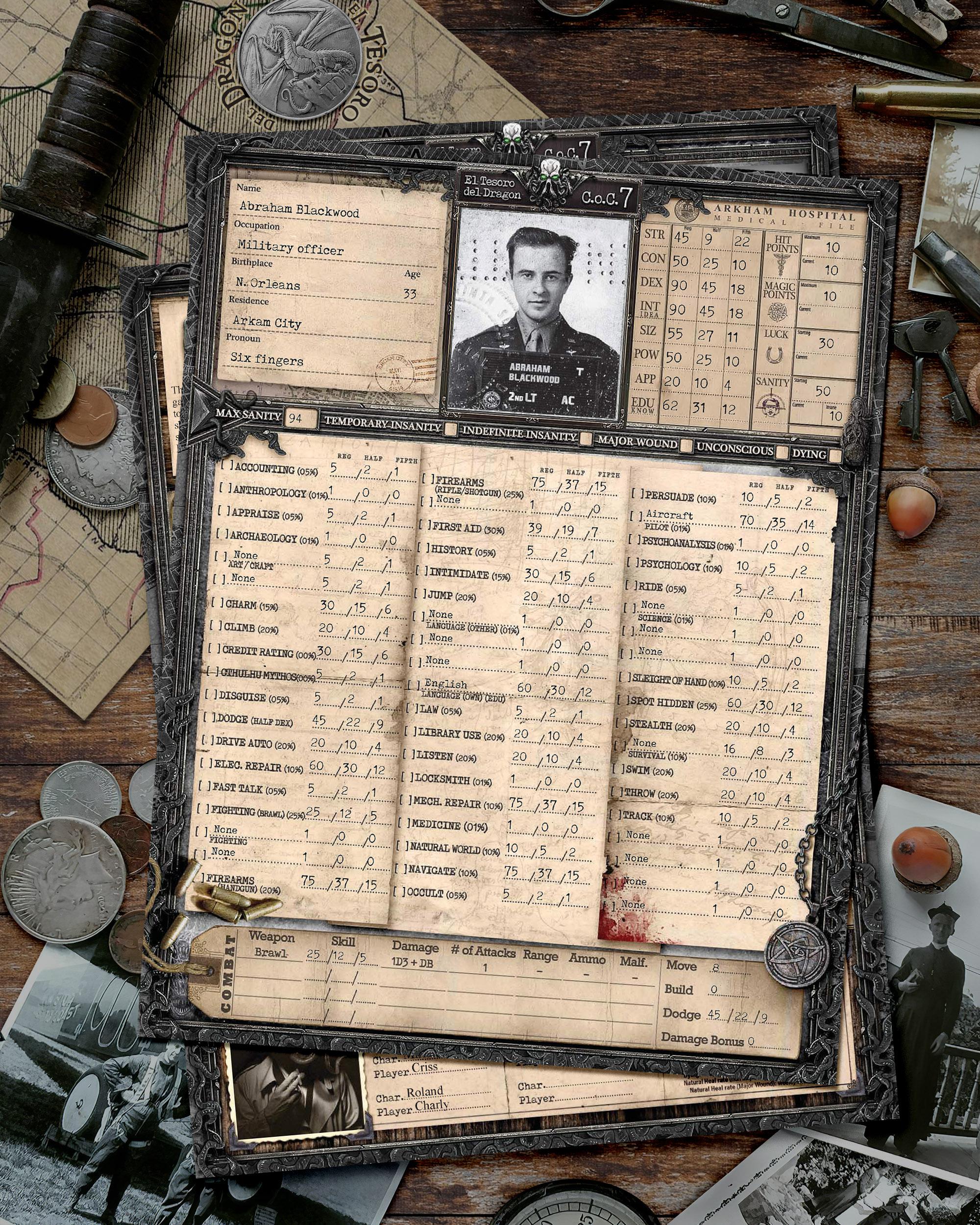Okay, so you’re ready to plunge into the chilling depths of the Cthulhu Mythos. But before you confront ancient evils and unspeakable horrors, you’ll need one crucial tool: the character sheet. This isn’t just a piece of paper; it’s your investigator’s lifeline, a record of their (likely dwindling) sanity, and a testament to their bravery (or perhaps, foolishness). This guide explores everything you need to know about Call of Cthulhu character sheets, from official resources to community creations, digital tools, and tips for crafting truly memorable investigators.
Navigating the World of Character Sheets
Your investigator’s journey into the heart of cosmic horror begins with the right character sheet. It’s more than just a collection of stats; it’s a reflection of your investigator’s identity, a tool for navigating the mysteries of the Mythos, and, let’s be honest, probably a chronicle of their impending doom (or, in the rare, glorious exception, their unlikely triumph).
Official Chaosium Resources: The Gold Standard
Chaosium, the keepers of the Mythos themselves, offers a range of official character sheets, providing a solid foundation for any investigation. These sheets are generally a great starting point, offering a balance between detail and usability. Whether you’re delving into the widely-used 7th edition, embracing the pulpy thrills of Pulp Cthulhu, or exploring the historical horrors of Dark Ages, Chaosium likely has a sheet tailored to your needs. They also offer resources for the older 6th edition and special sheets commemorating the game’s 40th anniversary. You can usually find these resources on their website, often tucked away in the “Free Downloads” or “Character Sheets” sections. Many even boast auto-calculation features, automatically updating those precarious stats as your investigator’s sanity slips – a true lifesaver when things get dicey. You can often choose between vibrant full-color versions or printer-friendly black and white, and some even include a third sheet for extra notes, sketches, or desperate pleas to forgotten deities.
Community Creations: A Wealth of Options
Beyond the official offerings lies a treasure trove of fan-made and third-party character sheets, each crafted with a unique vision. The dedicated Call of Cthulhu community continually expands the possibilities, creating sheets that cater to various playstyles and preferences. You might discover an online character manager like the one from The Dhole’s House (always a good idea to double-check sources!), which works seamlessly with 7th edition and auto-calculates everything, acting as a digital fortress against encroaching madness. If fillable PDFs are more your style, the internet harbors countless options, each with its own strengths and quirks. These community-created resources offer a wealth of customization options, allowing you to tailor your character sheet to your specific needs and preferences. You’ll find sheets with adjustable fields, adaptations for specific editions, and even accessibility features for players with visual impairments.
Digital Tools: Embracing the Electronic Age
Who says investigations need to be confined to paper? The digital age offers exciting possibilities for managing your investigator’s precarious journey. Online character managers, virtual tabletops like Roll20, and other digital tools can often integrate directly with your character sheet, creating a seamless and dynamic experience. Imagine stats that update in real-time, shared character information among players, and the satisfying click of digital dice rolls. It’s a Keeper’s dream and a player’s organizational salvation. While these tools may have a slight learning curve, they can significantly streamline your game, allowing you to focus on the unfolding horror rather than tedious calculations.
Customizing Your Sheet: A Personal Touch
Feel the urge to tinker with the forbidden knowledge contained within your character sheet? Customization allows you to personalize your investigator’s record, adding a unique touch to their journey into darkness. You can include new fields, rearrange existing elements, or even incorporate design features that reflect the specific horrors of your campaign. Just be warned: while knowledge is power in the world of Call of Cthulhu, too much knowledge can shatter the mind.
Accessibility: Gaming for Everyone
The thrills (and chills) of Call of Cthulhu should be accessible to all, regardless of their individual needs. Fortunately, the community often creates accessible character sheets for players with visual impairments or other disabilities. Large-print versions, Braille adaptations, and screen reader-compatible formats help ensure that everyone can join the investigation.
Mastering Character Creation
So, you’ve chosen your character sheet. Now, how do you bring your investigator to life? This section guides you through the process of creating a compelling character, ready to face the cosmic horrors that await.
Building Your Investigator: A Step-by-Step Guide
Creating a Call of Cthulhu character is a journey of discovery, a process of building a believable individual who will soon confront the unimaginable.
1. Laying the Foundation: Basic Information
Give your investigator a name, a profession (what they did before encountering the Mythos), and a brief background. These details are more than just labels; they provide the foundation for your character’s identity. What motivates them? What do they value? Resources like the Investigator Handbook (page 54) offer helpful suggestions, including period-appropriate names for 1920s settings.
2. Constructing the Framework: Characteristics
Characteristics represent your investigator’s core attributes, their potential for both greatness and madness. Are they intellectually gifted (high INT), remarkably strong (high STR), incredibly charismatic (high APP), or perhaps blessed (or cursed) with potent luck (high POW)? Your rulebook, regardless of the edition, will guide you through the process of assigning points to these crucial characteristics.
3. Adding the Details: Skills
Skills determine how your investigator interacts with the world, their ability to navigate the challenges and horrors they’ll face. Can they decipher ancient texts (Library Use), pick locks (Locksmith), persuade reluctant witnesses (Persuade), or spot crucial clues (Spot Hidden)? Skills are what make your investigator unique, their tools for survival in a world teetering on the brink of madness. Refer to your rulebook for guidance on calculating initial skill values.
4. Weaving the Narrative: Backstory
A compelling backstory is more than just window dressing; it’s the heart and soul of your investigator. It explains why they act the way they do, what experiences shaped their worldview, and what fears and motivations drive them. Perhaps their exceptional Library Use skill stems from a past life as a librarian, a detail that adds depth and richness to their character.
Choosing the Right Sheet
With a plethora of character sheets available, selecting the right one can feel overwhelming. Here’s a breakdown of the options:
- Official Sheets from Chaosium: These are reliable, often auto-calculating, and cover various editions, making them a safe and convenient choice.
- Fan-Made Sheets (e.g., John Hughes on Myth-O-Logic): These offer increased customization options and often include features like image integration.
- Other Fillable PDF Sheets: While readily available online, exercise caution and verify the source before downloading.
Embracing Auto-Calculation
Auto-calculating sheets are a modern marvel, eliminating the tedious calculations that plagued earlier editions. A change to one stat automatically updates related values, allowing you to focus on the unfolding horror rather than mathematical equations.
Matching Sheet to Edition
Ensure your character sheet aligns with the specific edition of Call of Cthulhu you’re playing. A 7th edition sheet differs from a Pulp Cthulhu sheet, which in turn differs from a Dark Ages sheet. Using the correct sheet ensures a smooth and consistent gameplay experience.
Prioritizing Accessibility
Accessibility is paramount. Seek out resources designed for players with diverse needs, including large print or Braille character sheets.
Keeper Wisdom: Tips from the Trenches
Experienced Keepers offer invaluable insights, gleaned from countless sessions of sanity-shredding investigations. Their advice can illuminate the path for new players, offering guidance and inspiration.
“A well-crafted character sheet is more than just numbers; it’s a window into your investigator’s soul. Embrace the narrative, and let it guide your actions in the game.” – Keeper Michael
“Don’t be afraid to personalize your sheet! Add details, drawings, anything that brings your investigator to life. It’s all about immersing yourself in the experience.” – Keeper Sarah
Call of Cthulhu vs. D&D: A Tale of Two RPGs
While both Call of Cthulhu (CoC) and Dungeons & Dragons (D&D) belong to the tabletop role-playing game (TTRPG) family, they offer vastly different experiences. D&D is a realm of heroic fantasy, where players embark on epic quests, vanquish fearsome monsters, and ascend to legendary status. CoC, on the other hand, is a chilling descent into cosmic horror, where ordinary individuals confront unimaginable terrors, often at the cost of their sanity.
Dice Rolls: Agency vs. Fate
The core mechanics of each game highlight this fundamental difference. D&D utilizes a d20 system, offering a sense of agency and predictable progression. CoC, however, revolves around the d100 (percentile dice), introducing an element of unpredictable chance that mirrors the capricious nature of the Mythos. Success in CoC feels fragile, always threatened by the looming presence of cosmic indifference.
Character Focus: Hero vs. Investigator
Character creation further distinguishes these games. In D&D, players craft larger-than-life heroes, choosing classes like valiant warriors or arcane wizards. CoC, conversely, focuses on ordinary people – professors, journalists, librarians – thrust into extraordinary circumstances. These investigators are defined not by their strengths, but by their resilience in the face of overwhelming dread.
Game Master Roles: Dungeon Master vs. Keeper
The roles of the game masters also diverge. The D&D Dungeon Master acts as a world-builder, storyteller, and referee. The CoC Keeper, however, is an architect of suspense and horror, their goal to instill a sense of creeping unease and the ever-present threat of madness.
Transitioning from D&D to CoC
Despite their differences, D&D players can certainly transition to CoC, provided they embrace a shift in mindset. The key is to relinquish the heroic power fantasy and embrace the vulnerability and suspense that define Lovecraftian horror.
| Feature | D&D | Call of Cthulhu |
|---|---|---|
| Genre | High Fantasy | Cosmic Horror |
| Dice System | d20 | d100 (Percentile) |
| Character Type | Heroes with distinct Classes | Investigators, Everyday People |
| Focus | Combat, Exploration, Progression | Investigation, Sanity, Roleplaying |
| Game Master | Dungeon Master (DM) | Keeper |
Solo Play in Call of Cthulhu: Embracing the Solitude
The horrors of the Mythos can be faced alone. Solo play offers a unique and often more terrifying experience, allowing for deep immersion into your investigator’s psyche.
Options for Solo Play
Several paths lead into the solitary darkness:
“Alone Against…” Series: Chaosium’s official solo adventures, starting with “Alone Against the Flames,” offer a structured and beginner-friendly introduction to solo play.
Mythic: This system acts as a digital game master, adding unpredictable twists and turns to any CoC scenario.
Community Resources: Online forums and subreddits like /r/callofcthulhu and /r/Solo_Roleplaying offer support, advice, and custom scenarios for solo players.
Solo Investigator’s Handbook: This comprehensive guide provides specialized techniques for running the game alone.
Creating Your Solo Investigator
Even in solitude, character creation is crucial. Invest time in developing a compelling backstory, exploring your investigator’s motivations and fears.
Comparing Solo Approaches
| Feature | “Alone Against…” Series | Mythic | Community & Handbook Resources |
|---|---|---|---|
| Structure | Linear | Adaptable | Varies |
| Difficulty | Beginner-friendly | Varies | Depends on resource |
| Preparation | Minimal | Requires setup | Varies |
| Immersion | Story-driven | Emergent gameplay | Highly variable |
| Predictability | More predictable | Unpredictable | Varies |
| Support | Limited | Community & resources | Active communities & guides |
Whether you choose the structured path of official solo adventures, the unpredictable nature of Mythic, or the collaborative spirit of online communities, solo play offers a rewarding and deeply personal way to experience the chilling mysteries of the Cthulhu Mythos. Remember, in the world of Lovecraftian horror, sometimes the greatest terrors lurk not in the shadows, but within the confines of our own minds.
- Understand bone yellow: Colorism’s impact on Black communities - April 19, 2025
- Green Natural Sandstone: Eco-Friendly Building Solutions - April 19, 2025
- Red Cross Flag: Protecting Humanity Through History - April 19, 2025
















